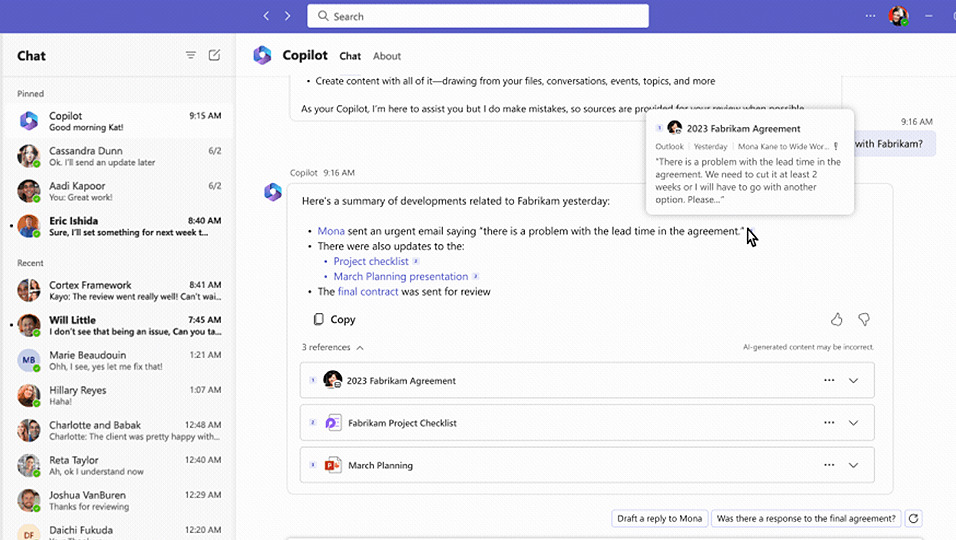Artificial Intelligence (AI) was once a luxury accessible only to deep-pocketed enterprises. However, thanks to Open AI’s ChatGPT, the doors to AI have swung open for businesses of all sizes.
With established names like Microsoft bringing AI solutions into the market, small and medium-sized businesses(SMBs) can access them without breaking the bank. What’s the best way SMBs can start using AI, and what should you consider before diving in? Let’s explore this in this blog post.
Where do I start?
The best way small businesses can get started with AI is by using ChatGPT. It’s become so widely recognised that chances are you’ve already tried its capabilities.
ChatGPT speeds up your work significantly in ways previously unimaginable. For example, it can help you write web pages, product briefs, customer emails, and even code snippets quickly. Or use it as a research tool to develop ideas, get recommendations, identify trends in your industry, conduct a competitive analysis, and so much more.
With generative AI, you don’t have to spend time creating things from scratch. It offers a new way of working that boosts your productivity and efficiency.
But is ChatGPT completely secure? No. Where exactly does the data fed into these AI bots end up? The security concerns surrounding AI are valid, so it’s crucial to avoid providing AI with confidential information that can potentially harm your business.
That’s where Microsoft Copilot comes in. Think of Copilot as ChatGPT but within the context of your work, with added Microsoft security controls in place. With Microsoft’s latest commitment, the data isn’t used to train AI, so rest assured that your data is handled securely.
Microsoft Copilot for small businesses
The benefit of Copilot is that it’s an off-the-shelf product seamlessly integrated into everyday Microsoft apps, such as Word, Excel, Powerpoint and Dynamics 365, allowing you to quickly gain massive value with minimal investment.
For instance, you can ask Copilot to bring together data from different Power BI reports and show the insights on a PowerPoint slide in seconds. It has the potential to reshape how SMBs work and bridge the gap between enterprises by achieving higher productivity with limited resources and money.
Integrated into CRM systems, it can generate your sales emails, marketing and customer service content, reflecting the tone of your previous messages and using contextual data. For instance, when a customer raises an issue, Copilot can scan your knowledge articles and past issues to suggest possible resolution steps. All of this in a fraction of the time it would typically take for a human agent.
Or, suppose a customer is asking for a discount on your latest proposal. You can ask Copilot to scan your CRM data and suggest a response, keeping it contextual to your business.
A key advantage of Copilot being a Microsoft product is the inherent trust it carries. You’re likely to have reservations about feeding business data into open-source solutions. However, with Microsoft’s established reputation for security, Copilot offers a sense of confidence and assurance that your data is in capable hands.

Top 4 things to keep in mind
Copilot is an excellent way to get started with AI, but if you want to create a customised AI product, you should keep a few things in mind. Since AI has become a buzzword, many organisations, including small businesses, are exploring how to jump on the bandwagon without considering if it’s truly the answer to their needs.
Step back and ask yourself these 4 key questions before you embark on an AI project.
1. How good is your data?
Remember, the output AI can generate is only as good as the data you feed into it. So first and foremost, make sure your data is as clean as possible without duplicates, inaccuracies and errors.
And don’t rush into AI; see if you are generating enough data to make this project viable. Without substantial data, you won’t get any relevant insights, so critically assess your data first.
2. What is the outcome?
Always arrive at the outcome first before you do anything else. What’s the outcome or business value you’re trying to derive from your data?
How is the project going to give you a competitive advantage? It sounds simple, but you can spend a lot of money trying to achieve something that doesn’t give you returns.
For example, we’ve done a project for a client in the insurance sector to determine how much each customer should pay for their policy based on the car they drive.
The end result was an AI-based system that analysed numerous data sets to arrive at a competitive price without human intuition, bias and manual effort. Similarly, think about how the outcome you’re trying to achieve will save you time and effort and what value it’ll bring.
3. Do I have the right resources?
Take stock of what you need to make this AI project work – not just in terms of money but also expertise. Do you have the right resources to do this in-house? Or do you need to engage a specialist partner like ANS? As a small business, do you have the budget this project demands?
Underestimating what you need could mean the project fizzles out or doesn’t deliver as expected.
4. Is your organisation prepared for AI-driven attacks?
With the use of AI come AI-driven attacks. Cybercriminals are using AI to assess vulnerabilities, speed up attacks and mimic human behaviour to infiltrate an organisation’s security system.
For instance, a UK-based energy firm was tricked into paying €220,000 by criminals who used AI-based software to impersonate the company’s chief executive’s voice. AI systems also frequently can access sensitive data, opening doors to potential cyber-attacks.
Are you prepared to counter these events? By partnering with a specialist security provider like ANS, you can rest assured that your infrastructure will be monitored 24/7/365 by our security experts and automated threat detection tools.
Next steps
AI can help small businesses increase employee productivity, improve customer interactions, automate routine tasks, and do more with less. Microsoft Copilot has democratised AI for small businesses, allowing you to access generative AI within the apps you use daily.
However, attempting to do it all on your own can be overwhelming. As your trusted partner, we are here to assist you every step of the way. Please contact us to discuss more about your AI ambitions.





